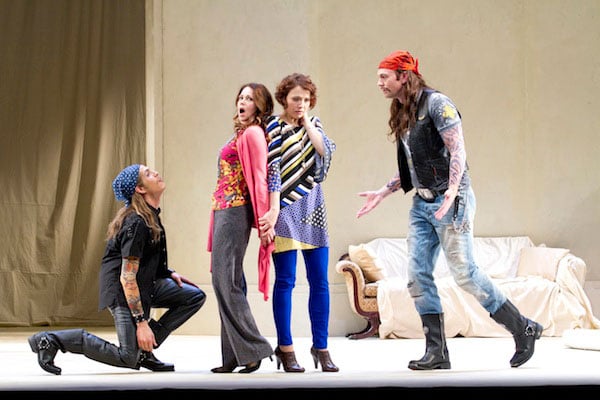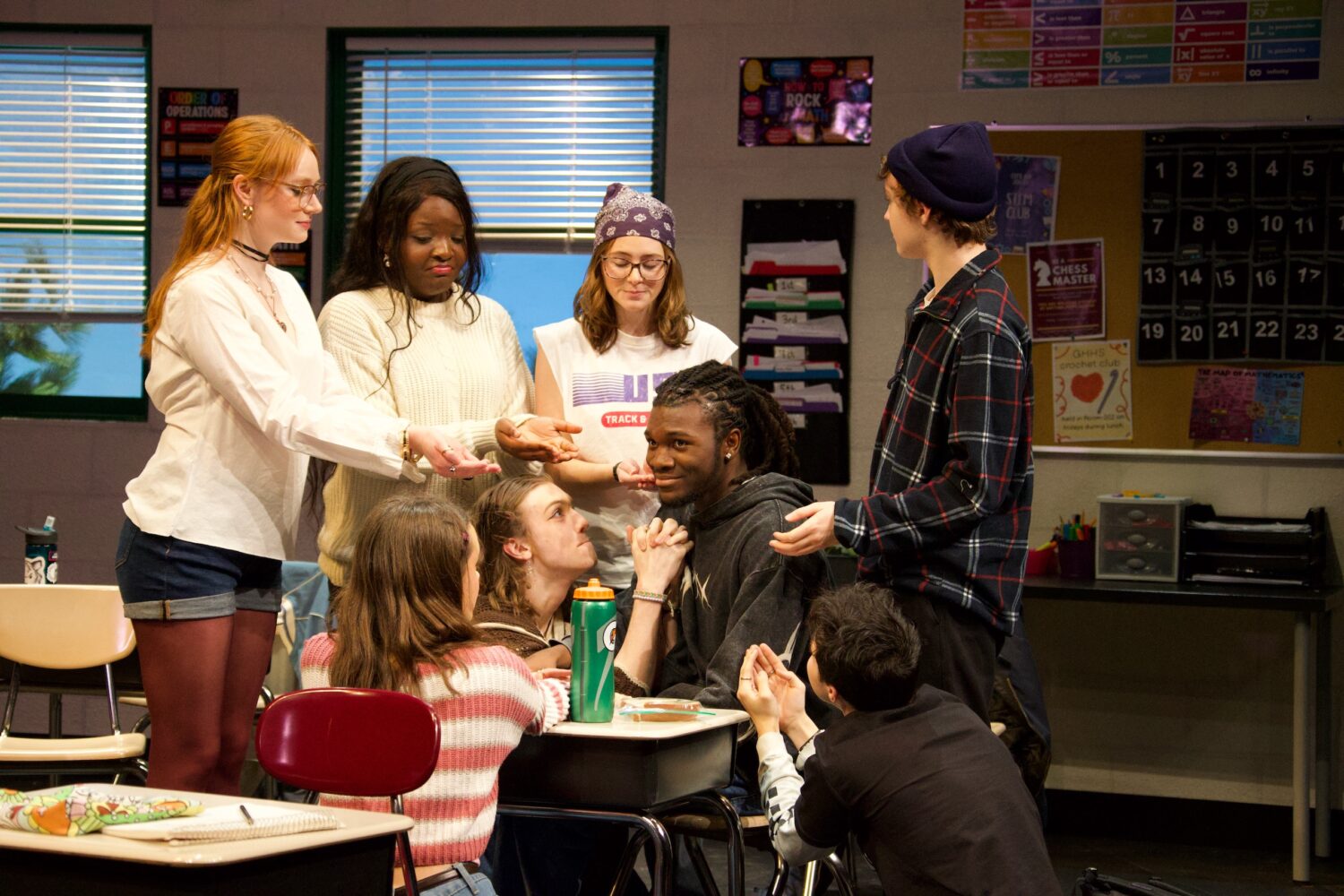Joel Prieto as Ferrando, Elizabeth Futral as Fiordiligi, Renata Pokupić as Dorabella, and Teddy Tahu Rhodes as Guglielmo in the Washington National Opera’s production of Così fan tutte. Photograph by Scott Suchman.
Of Mozart’s great operas (and of the three written in collaboration with librettist Lorenzo da Ponte), Così fan tutte presents the most difficulties, I think, for a contemporary audience. The problem rests not with Mozart’s sublime music, but with da Ponte’s text, which spins a tale of mistaken identities and fiancée-swapping, the kind of comic farce we know from Shakespeare or Boccaccio—only far more disturbing.
Proclaiming there’s no such thing as a faithful woman, the suave schemer Don Alfonso makes a bet with two young men, Ferrando and Guglielmo, that their fiancées, the sisters Dorabella and Fiordiligi, will not remain faithful to them for even a single day. All Ferrando and Guglielmo must do is pretend to go off to war—then don disguises, woo each other’s betrothed, and watch how fast their lovers betray them.
The lesson here is that women are unstable creatures by nature, easily manipulated and given to flights of infidelity, while the men in their lives are meant to accept these weaknesses, to simply get on with things—to laugh rather than weep at their misfortune. That’s a pretty sour view of human relations that borders, it seems to me, on misogyny.
In director Jonathan Miller’s production of Così fan tutte for the Washington National Opera, now playing at the Kennedy Center, however, the women aren’t the only ones who behave badly: Each of the characters is a narcissist (as the very prominent mirror on stage reminds us) and morally at odds with him or herself. The setting, instead of 18th-century Naples, is present-day Washington, allowing for all sorts of clever updating. Guglielmo (baritone Teddy Tahu Rhodes) and Ferrando (tenor Joel Prieto), for example, disguise themselves not as lovesick Albanians, but as tattooed bikers from Baltimore. And soprano Christina Brandes’s Despina (the sisters’ maid in Mozart’s original) has been recast as their pantsuit-clad personal assistant, fetching them lattes instead of preparing their hot chocolate. There are numerous nods to pop culture, as well, most of which I found cloying, kitschy, and ultimately distracting. When Fiordiligi (soprano Elizabeth Futral) and Dorabella (mezzo-soprano Renata Pokupić) appeared for the first time, swiping away at their smartphones, gazing into those devices like ancient Etruscan ladies staring into handheld mirrors, I become so fixated on the phones that I barely noticed the loveliness of the sisters’ duet, “Ah guarda sorella.”
But the ever-present cell phones are more than props. As emblems of our narcissistic digital age, in which social mores are established online, they’re essential to Miller’s conception. We don’t need to don complicated costumes, as Ferrando and Guglielmo do, to reinvent ourselves. Don’t we spend much of our time in disguise, behind avatars and Facebook profiles, our digital personas somehow more glamorous, more idealized, than who we truly are? Don’t we project our innermost desires onto these invented personalities? Are we even capable of exhibiting our authentic selves anymore? At its most ingenious (and subversive), Miller’s Così fan tutte suggests that deep down it’s all a deception: life, love, true fidelity.
This interpretation may not humanize da Ponte’s characters any more than traditional settings of the opera do, but that’s where the music comes in, some of the most glorious ensemble writing Mozart ever composed—the heavenly act one trio “Soave sia il vento”; Guglielmo and Dorabella’s flirtatious duet, “Il ore vi dono”; and quartets and quintets of great complexity and tenderness. With the exception of William Shimell, whose baritone was too restrained for the role of Don Alfonso, each of principals sang convincingly (though Pokupić’s voice showed some signs of strain toward the end). Futral, however, was particularly outstanding, her Fiordiligi both radiant and lyrical, tormented and multi-hued. She effortlessly traversed the two-octave range of her first-act aria “Come scoglio,” which compares her faithfulness to a rock amid a volatile sea—a brilliant example of coloratura art. And her moving second-act “Per pietà, ben mio” was full of anguish and despair.
I would have liked a bit more sparkle and verve, and lighter textures, as well, from the Washington National Opera orchestra, but aside from a few intonation problems in the strings and horns, conductor Philippe Auguin led an elegant, balanced performance that perfectly accompanied the singers.
Così fan tutte is at the Kennedy Center Opera House through March 15. Tickets ($25 to $300) are available through the Kennedy Center’s website.

















